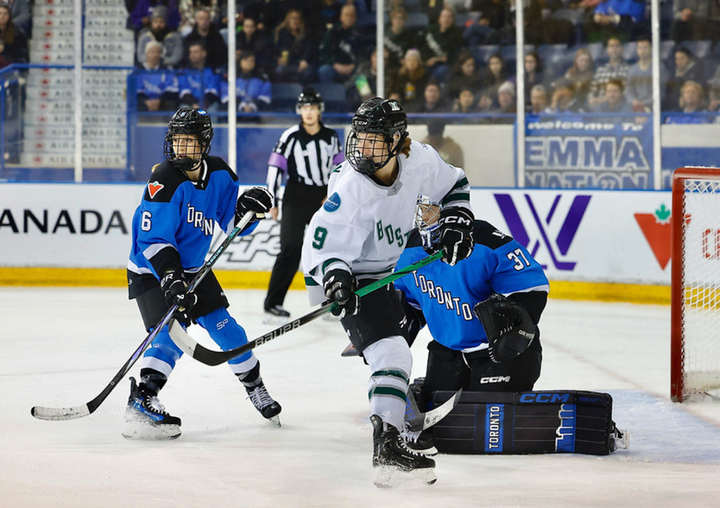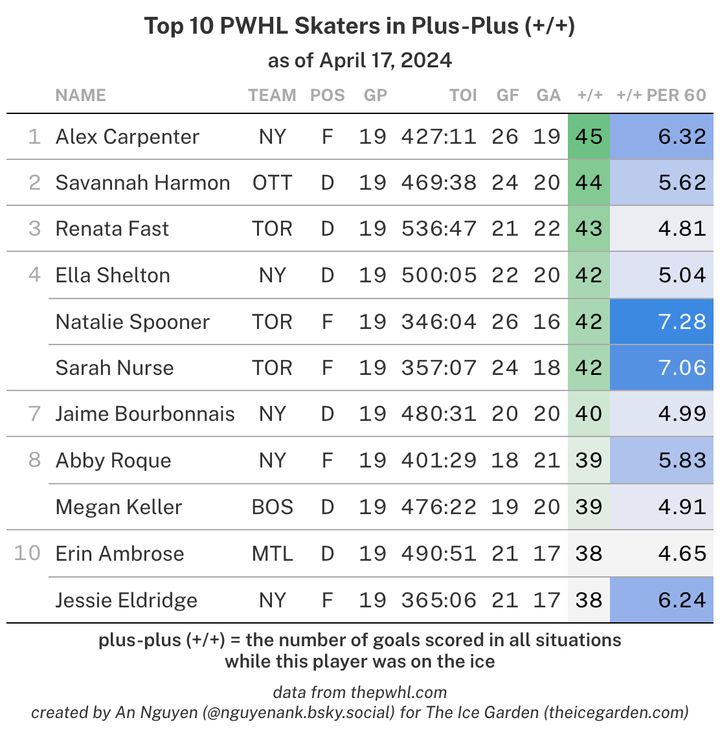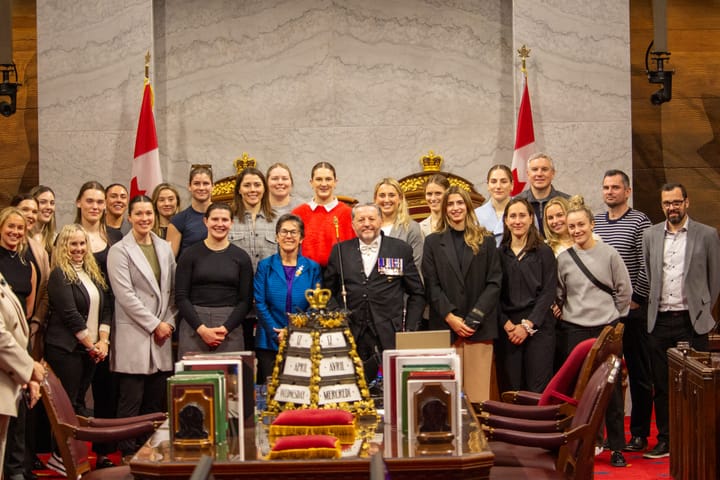Molly Engstrom on her decision to play in Sweden
"I'm going to Sweden because of the way things were handled in the NWHL."
On Monday, the NWHL announced the third player departure in the wake of salary cuts. Molly Engstrom of the Whale is the most recent separation; the former Connecticut captain is headed to play for Djurgårdens of the Swedish Women’s Hockey League (SDHL). According to the league press release, Engstrom played her last game for the Whale on Sunday. While no statement from her was provided, The Ice Garden was able to chat with the Olympic medalist on Tuesday.
Engstrom’s interest in playing in Sweden came as a result of her relationship with former Swedish forward Danijela Rundqvist. The conversation about playing in Sweden started back in 2014 when the retired US National Team player was getting her Master’s degree in Russia. The current Djurgårdens club director recruited her former foe, asking her to play in Sweden when done with school. “She kinda put the bug in my ear in that moment,” said Engstrom.
She considered the offer, but ultimately went on to work in New Hampshire. In 2014, Engstrom was named Assistant Athletic Director at Kimball Union Academy (KUA). She also served as the head coach of the Girls Varsity Hockey team.
Amerikanska stjärnan Molly Engstrom är klar för Djurgården https://t.co/jmkEHZepa1 pic.twitter.com/S3VVUbwDPe
— SportExpressen (@SportExpressen) December 19, 2016
Eventually Engstrom would come out of retirement and play with the Connecticut Whale, but that didn’t stop Rundqvist from her pursuit. While working the International Ice Hockey Federation (IIHF) U18 High Performance Camp in Vierumäki, Finland over the summer, Engstrom found herself in Stockholm visiting the Djurgårdens team, a first division team in the SDHL. At this time, lawsuits and other uncertainties plagued the NWHL. During that visit, Engstrom had a more serious conversation about the logistics of playing in Sweden.
“I essentially had two contracts in my hand this summer,” said Engstrom. In speaking with NWHL CFO Steve Skillen, she was assured players’ salaries would be paid for the upcoming season. “He guaranteed the salaries at least, without being able to guarantee, fully, hockey operations, or being able to hire staff,” said Engstrom.
She decided to stick with the NWHL. “It wasn’t an easy decision because,” she paused before continuing, “I had built a good relationship with the people in Sweden, I wasn’t sure what kind of a decision I was making for my future with the NWHL, but at the same time, I wanted– my first choice was to play domestically, and to contribute to the game here.”
Therefore, it was difficult to get the news of a 50% salary cut four games into the season, and especially just before the Thanksgiving break. During that time off, Engstrom, the other NWHL team captains and Players Association (PA) representatives scheduled conference calls to figure out where to go next. “For seven days straight it’s all I thought about, and all [the captains and player reps] talked about ... It was seven days of trying to put the pieces together.”
At a time when most were gathered around a table to join in fellowship and be thankful, she and the other NWHL players were trying to figure out how to survive, as a league and as individuals. “Whether players were totally relying on that money or not,” shared Engstrom, “that money not showing up heavily affected a lot of players in the league from a monetary and moral standpoint.”
Engstrom mentioned that she reread Tatiana Rafter’s blog entry for Stanley Cup of Chowder before our chat. Engstrom reflected, “I think [she] did an amazing job in the blog that she wrote immediately after this was announced. She shared the reality of the situation. I couldn’t have said it better.”
In her entry dated November 19th, 2016, Rafter wrote:
“I think I can speak for every NWHL player that we obviously want the league to succeed and are willing to make the sacrifices from our side, as demonstrated through our commitment, energy and time and our willingness to play for below market pay and travel conditions ...
“With the salary cuts, my total salary deficit will be around -$5,656 by the end of April. Essentially, by continuing to play and fighting for the future of our sport, I will be putting myself into debt and shouldering a disproportionate amount of risk personally – as will my peers.”
Related
From The Rafter: Survival of professional women's hockey hangs in the balance
Upon returning to Connecticut, Engstrom decided to enter into conversations with the Swedish league while waiting to hear how the NWHL would respond. Although she wasn’t ready to bow out completely, Engstrom felt inquiring about other possibilities was in her best interest.
Engstrom has no expectations of becoming a millionaire playing women’s hockey (that can be a topic for another day). However, a professional league must honor what is promised, especially when not doing so puts players in financial jeopardy. “We’re making a lot of sacrifices as it is, to be a part of this. We do it because we love it, but there is a certain standard. It’s good business and I don’t think that is too much to ask.”
While the “how” of a sustainable league that pays players may still be unknown, the level of transparency is one thing Engstrom would like to see change. In her statement, NWHL commissioner Dani Rylan stated, "[Salary cuts were] a decision we did not take lightly. It came after trying everything we could from a business perspective to avoid it.”
However, for Engstrom, being blindsided by the devastating news of the cuts - cuts that came four games into her season - begs the question, at what point, and for how long did the league know salary cuts were necessary? “I’m not going to Sweden because of my Swedish descent,” said Engstrom, "I'm going to Sweden because of the way things were handled in the NWHL."
Having more information, more honesty up front would have given players the capabilities to make decision on their own terms and in their best interests. Morgan Fritz-Ward agreed. “I never wanted to end [my career] like this, but I knew I needed to be serious about my other options,” she told The Ice Garden. Engstrom cosigned. “It was not an easy decision, like Morgan Fritz-Ward said. It was not by any means an easy decision to make. At the same time, I found myself in a difficult situation to move forward.”
“The argument has been made, ‘Well, we don’t want to give up on the little girls.’ Well, the other side of that is, I never want my little girl to grow up and settle.”
However, the opportunities a domestic league offer is not lost on Engstrom. Nor is the amount of work needed for it to succeed. “This is a huge undertaking to try and make women’s hockey professional. The NWHL has done some great things. Their efforts have taken the level of exposure through social media and other news outlets for our game to the next level. [The league] has done things with broadcasting and live streaming through YouTube to lead the way of promotion effectively. The efforts of the NWHL have created a niche media market place that didn’t exist before.”
Engstrom is also personally thankful for the creation of a domestic hockey league, “I would be remiss if I did not thank the NWHL for the opportunity to once again play with and against some of the best players in the world and to inspire young girls. At the same time, things do need to change and we are not quite sure how to go about doing that.”
Moving forward, Engstrom hopes that the players and the league can build a relationship and work together. Added Engstrom, “If that means working with Dani Rylan, that is going to take a lot of rebuilding trust.” As for the fans, she wants the league to survive for them, as much as for the players on the ice, “I hope that they continue to support the players, and there’s no indication that they [won’t].”
However, a bigger message she hopes will resonate is the power the players have, especially when unified. Engstrom also wants to be clear; players standing up for themselves and each other is not counter to growing the game or paving the path for the next generation.
“The argument has been made, ‘Well, we don’t want to give up on the little girls.’ Well, the other side of that is, I never want my little girl to grow up and settle.”
Engstrom, as a founding member of the Whale, is an NWHL pioneer. She knows that comes with a fair amount of mud to trudge through. However, she found herself asking, “When do you decide, I think I need to go in another direction?’”
For Molly, she’s choosing to march along a different path for now, in her quest to grow the game. While she is unsure what challenges and triumphs will come as she heads in a new direction, she is certain that her love for women’s hockey and her hope for its success is as strong as ever.





Comments ()